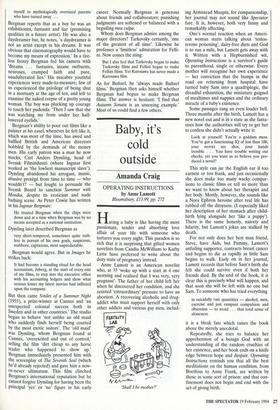Baby, it's
cold outside
Amanda Craig
OPERATING INSTRUCTIONS by Anne Lamott Bloomsbury, £13.99, pp. 272 Having a baby is like having the most passionate, tender and absorbing love affair of your life with someone who tortures you every night. This paradox is so rich that it is surprising that gifted women novelists from Candia McWilliam to Kathy Lette have preferred to write about the dozy state of pregnancy instead.
Anne Lamott is an American novelist who, at 35 'woke up with a start at 4 one morning and realised that I was very, very pregnant'. The father of her child left her when he discovered her condition, and she resisted 'extraordinary' pressure to have an abortion. A recovering alcoholic and drug- addict who must support herself with only other addicts and various gay men, includ- 'Shall I be mother?' ing Armistead Maupin, for companionship, her journal may not sound like Spectator fare. It is, however, both very funny and remarkably affecting.
One's normal reaction when an Ameri- can woman starts talking about 'testos- terone poisoning', dairy-free diets and God is to run a mile, but Lamott gets away with it. Written with a Hepburnished wit, Operating Instructions is a . survivor's guide to parenthood, single or otherwise. Every mother will recognise her own experience — her conviction that the bumps in the road on returning from hospital have turned baby Sam into a quadriplegic, the dreadful exhaustion, the miniature guignol of mealtimes and nappies and the ordinary miracle of a baby's existence.
Some passages rang an even louder bell. Three months after the birth, Lamott has a new novel out and is in a state as she fanta- sises how the authorities will try to get her to confess she didn't actually write it:
Look at yourself! You're a goddam mess. You've got a functioning IQ of less than 100, your nerves are shot, your hands tremble . . . You have trouble writing out checks, yet you want us to believe you pro- duced a novel?
This style can jar the English ear if too earnest or too frank, and just occasionally she does make too many wacky compar- isons to classic films or tell us more than we want to know about her therapist and her body. Mostly, however, she sounds like a Nora Ephron heroine after real life has rubbed off the ditsyness. (I especially liked her description of her stomach after child- birth lying alongside her 'like a puppy'). There is the same honesty, naivety and hilarity, but Lamott's jokes are stalked by death.
For not only does her best man friend, Steve, have Aids, but Pammy, Lamott's unfailing supporter, contracts breast cancer and begins to die as rapidly as little Sam begins to walk. Early on in her journal, Lamott records that before Sam's birth she felt she could survive even if both her friends died. By the end of the book, it is clear this is precisely what will happen, and that soon she will be left with no one but Sam. To someone who has tried everything
in suicidally vast quantities — alcohol, men, exercise and just rampant compulsion and obsession — to avoid . • that total sense of aloneness
it is a bleak fate which raises the book above the merely anecdotal.
Repeatedly, she tries to balance her apprehension of a benign God with an understanding of the random cruelties of her existence, and her book ends on a knife edge between hope and despair. Operating Instructions reminds you that all the best meditations on the human condition, from Boethius to Anne Frank, are written by those in some sort of prison: and that con- finement does not begin and end with the act of giving birth.


















































 Previous page
Previous page